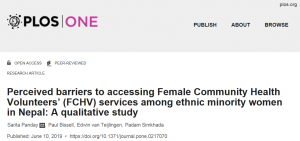 This week saw the publication of ‘Perceived barriers to accessing Female Community Health Volunteers’ (FCHV) services among ethnic minority women in Nepal: A qualitative study’ [1]. This article in the Open Access journal PLoS ONE highlights the key role volunteers play in delivering health services to minorities/the poorest people, especially in low-income countries like Nepal.
This week saw the publication of ‘Perceived barriers to accessing Female Community Health Volunteers’ (FCHV) services among ethnic minority women in Nepal: A qualitative study’ [1]. This article in the Open Access journal PLoS ONE highlights the key role volunteers play in delivering health services to minorities/the poorest people, especially in low-income countries like Nepal.
 This paper studies community health workers in Nepal, who are known as Female Community Health Volunteers (FCHVs). To address this issue, we conducted a qualitative study to explore perceived barriers to accessing maternal and child healthcare services among ethnic minority groups in two different parts of Nepal with varying degrees of access to local healthcare centres. Semi-structured interviews were conducted with twenty FCHVs, 26 women service users and 11 paid local health workers. In addition, 15 FCHVs participated in four focus group discussions.
This paper studies community health workers in Nepal, who are known as Female Community Health Volunteers (FCHVs). To address this issue, we conducted a qualitative study to explore perceived barriers to accessing maternal and child healthcare services among ethnic minority groups in two different parts of Nepal with varying degrees of access to local healthcare centres. Semi-structured interviews were conducted with twenty FCHVs, 26 women service users and 11 paid local health workers. In addition, 15 FCHVs participated in four focus group discussions.
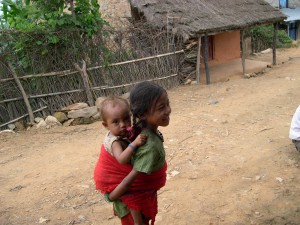 A thematic analysis of the data identified five major themes underlying barriers to accessing available maternal and child healthcare services by ethnic minority groups. These themes include: a) lack of knowledge among service users; b) lack of trust in volunteers; c) traditional beliefs and healthcare practices; d) low decision-making power of women; and e) perceived indignities experienced when using health centres. The paper concluded that community health programmes should focus on increasing awareness of healthcare services among ethnic minority groups, and the programmes should involve family members (husband and mothers-in-law) and traditional health practitioners. Both the FCHVs and local healthcare providers should be trained to communicate effectively in order to deliver respectful care among ethnic minorities if we want to achieve universal healthcare coverage for maternal and child health in low- and -middle income countries.
A thematic analysis of the data identified five major themes underlying barriers to accessing available maternal and child healthcare services by ethnic minority groups. These themes include: a) lack of knowledge among service users; b) lack of trust in volunteers; c) traditional beliefs and healthcare practices; d) low decision-making power of women; and e) perceived indignities experienced when using health centres. The paper concluded that community health programmes should focus on increasing awareness of healthcare services among ethnic minority groups, and the programmes should involve family members (husband and mothers-in-law) and traditional health practitioners. Both the FCHVs and local healthcare providers should be trained to communicate effectively in order to deliver respectful care among ethnic minorities if we want to achieve universal healthcare coverage for maternal and child health in low- and -middle income countries.
The paper is based on the PhD research conducted by Dr. Sarita Panday in ScHARR at the University of Sheffield. Dr. Panday is currently affiliated with the Walter H. Shorenstein Asia-Pacific Research Centre (APARC) at Stanford University in the USA. Her co-authors are Prof. Paul Bissell at the University of Huddersfield, FHSS’s Visiting Prof. Padam Simkhada at the Liverpool John Moores University and BU Prof. Edwin van Teijlingen. This is the second paper from Dr. Panday’s excellent thesis, the first paper was also published in an Open Access journal BMC Health Services Research [2].
References:
- Panday S, Bissell P, van Teijlingen E, Simkhada P (2019) Perceived barriers to accessing Female Community Health Volunteers’ (FCHV) services among ethnic minority women in Nepal: A qualitative study. PLoS ONE 14(6): e0217070.
- Panday S, Bissell P, van Teijlingen E, Simkhada P (2017) The contribution of female community health volunteers (FCHVs) to maternity care in Nepal: a qualitative study. BMC Health Services Research 17(1):623.
 New CMMPH publication on maternity care in Nepal
New CMMPH publication on maternity care in Nepal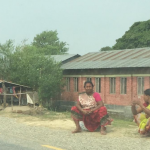 Nepal paper by Lesley Milne (CMMPH)
Nepal paper by Lesley Milne (CMMPH)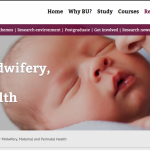 New reproductive health paper Dr. Preeti Mahato
New reproductive health paper Dr. Preeti Mahato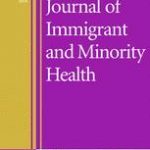 New BU migrants’ health publication
New BU migrants’ health publication










 Nursing Research REF Impact in Nepal
Nursing Research REF Impact in Nepal Fourth INRC Symposium: From Clinical Applications to Neuro-Inspired Computation
Fourth INRC Symposium: From Clinical Applications to Neuro-Inspired Computation ESRC Festival of Social Science 2025 – Reflecting back and looking ahead to 2026
ESRC Festival of Social Science 2025 – Reflecting back and looking ahead to 2026 3C Event: Research Culture, Community & Cookies – Tuesday 13 January 10-11am
3C Event: Research Culture, Community & Cookies – Tuesday 13 January 10-11am Dr. Chloe Casey on Sky News
Dr. Chloe Casey on Sky News ECR Funding Open Call: Research Culture & Community Grant – Application Deadline Friday 12 December
ECR Funding Open Call: Research Culture & Community Grant – Application Deadline Friday 12 December MSCA Postdoctoral Fellowships 2025 Call
MSCA Postdoctoral Fellowships 2025 Call ERC Advanced Grant 2025 Webinar
ERC Advanced Grant 2025 Webinar Horizon Europe Work Programme 2025 Published
Horizon Europe Work Programme 2025 Published Update on UKRO services
Update on UKRO services European research project exploring use of ‘virtual twins’ to better manage metabolic associated fatty liver disease
European research project exploring use of ‘virtual twins’ to better manage metabolic associated fatty liver disease